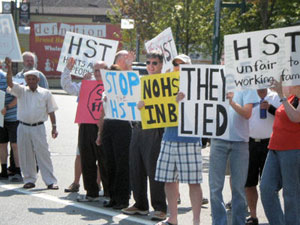
The results of the HST referendum are in. British Columbians voted to kill the tax in favour of returning to the old provincial sales tax system.
Results released by Elections BC show that 54 per cent of British Columbians voted Yes to extinguish the tax and to reinstating the old GST/PST system in a mail-in ballot referendum conducted between June 13 and Aug. 5. Here is what some of the key players said today:
Premier Christy Clark
Disappointed but unsurprised by the results of the referendum, Premier Christy Clark told reporters in a press conference today that "the public has very clearly spoken," and that she is committed to returning to the GST/PST system with the exemptions that existed prior to the HST.
"I think it's reasonable to acknowledge that this would've been a come-from-behind victory if the HST had won," Clark said. "If the HST had been introduced in a different way, it may have ultimately met with a different reception from British Columbians. People were really upset with the way it was brought in."
Still, Clark found reasons for optimism in the province's rejection of the tax, saying that her government's "listening process" of engaging with voters across B.C. on the HST translated into a "huge voter turn-out."
"When I became premier, I said, 'We are going to change the process, we are going to change the way government engages with citizens.' And in the course of this HST debate, I think we did that," Clark said.
The premier repeatedly dodged questions about the possibility of a fall election, saying her focus is on job creation and protecting current jobs in the face of global economic instability. She added that an election would cause further instability, no matter when it's called.
"I'm going to be focused on the creation of jobs until May 2013, if that's when the election is held," Clark said. "Until the day before the election is held, I'm going to be focused on that."
Finance Minister Kevin Falcon
Finance Minister Kevin Falcon said the BC Liberal government accepts full responsibility for the way the HST was implemented and for failing to convince British Columbians of its benefits.
"The buck stops with us. We are responsible. We accept responsibility," he said in a press conference following the announcement.
"We made the decision to piggyback on something that was happening in Ontario with their introduction of HST and their agreement with the feds and we should have stopped and had that discussion with the public first," Falcon said.
"We made that decision and we are responsible for that decision and I don' think we've ever been able to overcome that."
Falcon said he is not surprised at the result of the referendum and that he was prepared for the worst.
"We recognized when we started, from a place where 85 per cent of the public were opposed to the HST, in large measure due to our own mishandling of the introduction of that major policy change, that we had an uphill battle," he said.
"We already had put a team together and started weeks ago," he said, referencing what Christy Clark this week called "Plan B."
Rolling back the clock to the old system means rehiring staff to fill positions at PST offices and filling a $3-billion hole in the province's fiscal budget. B.C. will have to repay Ottawa the $1.6-billion transfer payment it paid the province to switch to the HST system. The remaining $2.4 billion portion of the deficit is due to reduced revenues to be drawn from the PST system instead of the HST system.
"Obviously the return to the PST creates some significant pressures in terms of government budget," said Falcon.
He said the government will stick to its commitment to balance the budget by 2014, but didn't offer any specific methods of achieving that. Falcon said the government will "continue to protect spending in healthcare and education."
Asked how the government was going to find an extra $3 billion to fill the gap, Falcon said it's a manageable amount when considered over several years and cited the government's history of dealing with "challenges" in the past.
"We can manage it. Just like we managed lots of other things in the past, whether it was SARS or some of the other challenges, forest fires and other things that come about, or international meltdowns. We have managed crises in the past," he said.
"This is a bump in the road, a significant bump in the road indeed, but... it is a manageable bump in the road."
Falcon said a reduction in revenue means reduced spending and finding alternative ways of generating government income.
"I think the public needs to know that less revenues mean government is going to have to tighten its belt," he said.
"As government manages to get to a balanced budget it means that we will be saying 'No' a lot more than we will be saying 'Yes,' particularly for demands to increase spending."
Bill Tieleman
Bill Tieleman, who played an integral part of the fight-HST campaign, said the 18 months it will take to repeal the tax is far too long.
"I think it's incumbent on the government now to act quickly to get rid of the HST. An 18-month delay is totally unacceptable and there are tens of thousands of British Columbians delaying significant purchases on home repairs, new homes, domestic airline flights, many other potential expenditures. There are all sorts of savings to be had once the HST is gone and people will just wait until this is resolved.
"What the government should do now is level with British Columbians about the province's finances. Instead of blaming British Columbians for their vote or punishing them for their decision by cutting services or raising some other tax, they should try and find some common ground so we don't have another divisive situation."
Tieleman said the anti-HST vote was successful despite the fact that British Columbians were repeatedly told a citizens' initiative would not work and that government and business ad spending far outpaced anti-HST expenses.
"To wage their fight in defence of the HST, business paid at least $10 million, and that's on top of the $5 million spent by the government. Our side, those who wanted to do away with the HST, were outspent probably 100 to one," he said.
Tieleman said the government should really listen to what the electorate has been repeatedly telling them. "Every credible poll was against the HST from the day announced to today," he said.
"If Gordon Campbell had had second thoughts about the HST and done the right thing, he'd still be the premier. On the down side, we'd still have Christy Clark on the radio.
"But I'm not sure that this defeat means Christy Clark isn't going to call an early election in the near future. The factor for them deciding on that is polling. If they poll and think that it works for them that people are saying to themselves 'That's over, we got rid of Campbell and the HST,' Clark and her team might be able to say 'That's behind us and you don't want the NDP in..."
But Tieleman wonders if British Columbians can trust Clark.
"One of the mysteries to me is Christy Clark had one of most golden opportunities imaginable to avoid the HST. When she was on radio and when she ran for premier, [she] could have distanced herself from it. Instead she has solidly endorsed it and invested in it. Simply from a technical perspective, it showed remarkably bad political judgment, in my opinion."
BC NDP leader Adrian Dix
Provincial NDP leader Adrian Dix said today is a great day for democracy in British Columbia.
"Really the people won over Liberal arrogance," he said on a conference call.
"While there was genuine anger at the Liberal party and the fact that they misled people to bring in the HST, I also think that people thought about it and they made the right decision," Dix said.
Dix noted that while all provincial ridings represented by NDP MLAs voted to abolish the HST, numerous Liberal ridings also voted Yes.
"Christy Clark and Kevin Falcon and their government didn't want it to happen, but people responded to a Liberal party that had misled them in the election campaign, the result today was really a remarkable victory for the Yes side," he said.
Dix, like Tieleman, also took issue with the lengthy transition period Minister Falcon said is necessary to switch back to the old system.
"Ms. Clark and the Liberals today suggested that even though it took 11 months to bring the HST in, it will require at least 19 months to go back to the PST. We will be holding them to account because I think really it's in the interest of the economy of B.C. now to return to the PST as soon as possible.
"Liberal arrogance and, frankly, the deliberate deceiving of voters has been very costly to the B.C. economy and the sooner that we get back to the provincial sales tax system that was in place, the better," he said.
Dix disagrees with Falcon's assertion that the Liberals failed to properly educate British Columbians on the merits of an HST system.
"It wasn't difficult for them to understand, they understood it all too well," he said.
Asked if he felt like he had an emboldened level of support from the business community, who may view the referendum as a failure of the Liberal party to represent their interests, Dix said the small business community always supported his stance against the HST.
"I campaigned in 33 communities across B.C. and in every one of them we had events with small businesses who supported my position to vote Yes to scrap the HST," he said.
"I think in general the government handled this in an inept way, and that will reflect badly on them.
"On balance, this isn't a thunderstorm on a sunny day. This has been a two-year campaign. People took the issue seriously, and a huge number of them voted," Dix said, adding that the Yes vote received about 150,000 more votes than the No vote, despite the fact that "the government spent so many million of public funds on Liberal party ads."
The Tyee will update this story with more reactions as they come in. ![]()
Read more: Politics















Tyee Commenting Guidelines
Comments that violate guidelines risk being deleted, and violations may result in a temporary or permanent user ban. Maintain the spirit of good conversation to stay in the discussion.
*Please note The Tyee is not a forum for spreading misinformation about COVID-19, denying its existence or minimizing its risk to public health.
Do:
Do not: